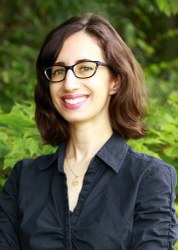
Layli Miron is one of two dissertation fellows in the Center for Democratic Deliberation this year. In this post, she shares more about her research on immigration, religion, and rhetoric.
What is your driving research question?
Overall, my work is driven by the question, “How might humans be persuaded to forge equitable relationships across identity borders, especially those of nationality?” More specifically, my dissertation asks, “What resources might religious rhetoric provide to pro-immigrant arguments?”
How did you become interested in your research project?
I have been interested in immigration for a long time, at least since high school, when I started to think about how ESL programs risk segregating immigrant students. This interest was brought closer to home when I accompanied my husband, who is from Moldova, through the complex, lengthy process of applying for him to immigrate to the United States. The dissertation project arose from this ongoing interest in immigration along with some research I’d done on how religious rhetors forge transnational connections. I figured the dissertation was a great opportunity to weave those two threads, immigration and religion, together!
Have you had to learn anything new or challenging over the course of your work?
One exciting challenge was complementing the kind of research typical in my field—close readings of published texts—with qualitative methods. I conducted participant-observation, which was a new method for me, at an organization that serves and advocates for undocumented immigrants. I also conducted a series of interviews with Bahá’í and Zoroastrian immigrants from Iran. Both of these sub-projects, as human subject research, necessitated creating a research protocol and working to obtain IRB approval—which came with a learning curve! The entire process of planning and conducting qualitative research was immensely illuminating. Having conversations with deported immigrants and religious refugees—people who are living the consequences of discourse about immigration—was eye-opening.
How does your work apply to issues of democratic deliberation? What problems related to the substance or quality of civic discourse do you think it could address?
The way we talk about immigrants has real consequences in terms of policy, prejudice, and even violence—a point tragically illustrated by the recent El Paso shooting, in which the killer parroted anti-immigrant pundits in explaining his decision to target Latinx people. How can a democracy function when its immigrants—almost 15% of the U.S. population—are under attack, discursively and materially? True democratic deliberation must heed immigrants’ voices. In my project, I propose rhetorical strategies for fostering more inclusive dispositions, which are inspired by the advocacy case studies I examine. I hope such strategies will be taken up more widely to improve the quality of civic discourse.
What are your post-dissertation plans? What do you hope to do next with your research?
One goal is to bring the dissertation project to publication. Beyond that, I plan to keep working at the nexus of civic discourse and immigration, with the objective that my research will contribute to building a more inclusive society. So, I plan to look for more ways to engage in the public humanities, beyond the initial steps I’ve taken (e.g., I arranged a project for my first-year writing students to compose blog posts for the Mid-State Literacy Council, which serves many immigrants, and I’m volunteering there as a tutor). Broadening this work to ensure my research is serving society is my primary objective moving forward.